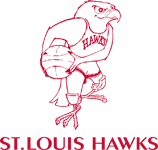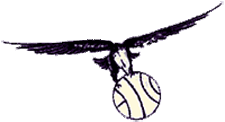St. Louis Hawks

Historical Moments:
1955/56: After four last-place seasons in Milwaukee, the Hawks arrived in St. Louis, who had once been home to the Bombers, an early BAA franchise that folded in 1950, and were on the verge of becoming one of the top teams in the NBA with second-year Forward Bob Pettit. In their first season in the Gateway City, Pettit would earn the very first MVP award in NBA history while leading the Hawks into second place with a 33-39 record. In the playoffs against the Minneapolis Lakers, the Hawks would take Game 1 by a single point before heading to Minneapolis, where they were blown out by 58 points in Game 2. However, in the decisive third game back in St. Louis, the Hawks would again win by one point to advance to the Western Finals, despite being outscored by 56 points in three games. In the West Finals, the Hawks would get off to a quick start taking the first two games against the Fort Wayne Pistons. However, the Pistons would rebound to take the next three games and the series in five games.
1956/57: Before the start of the season, the Hawks made one of the biggest draft-day deals in NBA history, sending second overall pick Bill Russell to the Boston Celtics for Rookie Guard Cliff Hagan and second-year star Ed Macauley, who had been a popular player at St. Louis University. Despite the moves, the Hawks struggled most of the season as Coach Red Holzman was fired midway through the season. Initially, the reigns were handed to guard Slater Martin, who led the Hawks to a 5-3 record. However, Martin did not want the added responsibility, so backup Alex Hannum took over the rest of the season. Despite a 34-38 record, the Hawks would claim the Western Division by a tiebreaker earring a bye into the Western Finals, where they would sweep the Minneapolis Lakers in three straight games to set up a matchup with Boston Celtics in the NBA Finals. The Hawks would get off to a fast start taking Game 1 in double overtime 125-123 in Boston. After the Celtics rebounded to take Game 2 the Hawks took Game 3 at home by two points the Celtics evened the series with a five-point win in Game 4. After losing Game 5 in Boston, the Hawks needed another two-point victory at home to force a decisive seventh game. Game 7 in Boston would be a tight battle al the way going into double overtime. However, the Celtics would emerge victorious, winning by two points.
1957/58: Coming off their trip to the NBA Finals, the Hawks were flying high, taking the Western Division by eight games with a solid 41-31 record as they played a strong ball control game with Bob Pettit ranking third in scoring and second in rebounding. In the Western Finals, the Hawks would have no problem with Detroit Pistons taking the series in five games, which included a dominant Game 4 performance in which the Hawks won by 44 points. Facing the Boston Celtics in the NBA Finals again, the Hawks once aging steal Game 1 in Boston and headed home with the series tied at a game apiece. Once again, the Hawks took Game 3, as the Celtics lost Bill Russell to an ankle injury. Despite playing without Russell, the Celtics evened the series in Game 4. Back in Boston in Game 5, the Hawks pulled out a two-point victory to take control of the series. Needing a win at home for their first NBA Championship, the Hawks beat the Celtics 110-109 as Bob Pettit scored 50 points playing against an injured Bill Russell as the Hawks won their first NBA Championship.
1958/59: Despite winning the NBA Championship, Coach Alex Hannum was replaced by Andy Phillip, who would only last two games before being replaced by Ed Macauley. The Hawks would also make changes to the team acquiring Clyde Lovellette from the Cincinnati Royals. The Hawks would go on to win the Western Division easily with a solid 49-23 record as Bob Pettit took home his second MVP award while leading the league in scoring with 29.2 ppg. However, in the Western Division Finals, the Hawks would be stunned by the Minneapolis Lakers in six games.
1959/60: The Hawks continued to remain the dominant team in the West, claiming their fourth straight division title by 16 games with a 46-29 record, as Bob Pettit, Cliff Hagan, and Clyde Lovellette all averaged more than 20 points per game. In the Western Finals the Hawks faced the Minneapolis Lakers and again found themselves needing a win in Game 6 on the road to stay alive. However, this time there would be no upset as the Hawks dominated the Lakers winning by 21 points to force a seventh game back at home, which they won 97-86 to earn a trip to the NBA Finals. Facing the Boston Celtics for the third time in four years, the Hawks again gave the Celtics all they could handle alternating wins as the series went to a seventh game. However, in Game 7, the Celtics would pull away with the title as Bill Russell scored 18 pints in the second quarter.
1960/61: Despite reaching the finals fickle owner Ben Kerner changed coaches again during the off-season, replacing Ed Macauley with Paul Seymour. On the court, the Hawks rookie Lenny Wilkins was the most significant change averaging 11.7 points in his first year. However, the bulk of the scoring once again came from the Hawks’ front line of Bob Pettit, Cliff Hagan, and Clyde Lovellette, who combined for 72.0 points per game, as the Hawks easily won the West by 15 games with an impressive record of 51-28. In the playoffs, the Hawks needed a one-point overtime win in Game 6 on the road to force a seventh game at home in which they beat the Los Angeles Lakers by two points. Facing the Boston Celtics in the NBA Finals again, the Hawks would not be able to step up to the challenge falling in five games as the Celtics won the fourth NBA Title in five years.
1961/62: With Lenny Wilkens, being called up for reserve duty and Clyde Lovellette suffering a midseason heel injury the Hawks struggle going through three different coaches, including Bob Pettit who served as a player-coach in the final six games, while missing the playoffs for the first time in six years while finishing in fourth place with a disappointing record of 29-51.
1962/63: After their disastrous season, the Hawks made a house cleaning naming Harry Gallatin as their new head coach. Lenny Wilkens would return from his reserve stint as the Hawks added four players from the floundering ABL, a rival league which was in its second year. The moves would pay off as the Hawks rebounded from their disappointing season to finish in 2nd place with a record of 48-32. Despite all the changes, the go-to guy remained Bob Pettit, who finished fourth in the NBA win scoring with 28.4 ppg and rebounding with 15.1 rpg. In the playoffs, the Hawks would fly past the Detroit Pistons in four games to set up a matchup with Los Angeles Lakers in the Western Finals. Both teams would each defend their home court as the series went to seven games. However, in Game 7 in Los Angeles, the Hawks were unable to break the home court trend falling by 15 points.
1963/64: The Hawks continued to tinker with their roster acquiring guard Richie Guerin from the New York Knicks in n early-season trade, on the way to another second-place finish with a record of 46-34. In the playoffs, the Hawks and Los Angels Lakers would meet in the first round, with each team again holding serve at home. However, this time the decisive fifth game was in St. Louis, and the Hawks would advance to the Western Finals with a 121-108 victory. Facing the San Francisco Warriors in the Western Finals, the Hawks would steal Game 1 on the road. However, the Warriors would recover to take three of the next four games as the Hawks need a dominant effort in Game 6 to force a seventh game. However, the Hawks would fall in Game 7 on the road for the second year in a row.
1964/65: The Hawks would get off to a slow start as Bob Pettit missed 30-games with a knee injury. To shake things up, the Hawks again changed coaches as Harry Gallatin was replaced by Richie Guerin, who served as player-coach. Under Guerin, the Hawks would finish the season strong, winning 28 of 47 games to finish in second place with a record of 45-35. However, in the playoffs, the Hawks would be shot down by the Baltimore Bullets in four games. Following the season, Bob Pettit would announce his retirement after a stellar 11-year career in which he became the first player to top 20,000 points in his career.
1965/66: Without Bob Pettit, the Hawks would struggle to post a 36-44 record as center Zelmo Beaty had a breakout year with 20.7 ppg and 13.6 rpg. Despite their poor record, the Hawks would sneak into the playoffs earning a rematch with Baltimore Bullets. The Hawks would quickly get revenge winning in three straight games to reach the Western Division Finals. In the Western Finals, the Hawks would soon find themselves in a 3-1 hole facing the Los Angeles Lakers. However, the Hawks would not quit winning the next two games to force a seventh game. However, the Lakers would end up winning the deciding match by nine points.
1966/67: Before the start of the season Cliff Hagan the final reaming player from the 1958 Championship team, would depart signing with Dallas Chaparrals of the newly formed ABA. To replace Hagan, the Hawks drafted Lou Hudson, who had a dazzling rookie season leading the team with 18.4 ppg, as the Hawks finished in second place with a 39-42 record. In the playoffs, the Hawks would sweep the expansion Chicago Bulls in three straight games to reach the Western Division Finals, where they would fall in six games to the San Francisco Warriors.
1967/68: With Zelmo Beaty and Lenny Wilkens averaging more the 20 ppg, the Hawks had their finest season in St. Louis posting a 56-26 record and finishing in first place. However, in the playoffs, the Hawks would be stunned in the first round by the San Francisco Warriors in six games. Following the season, St. Louis fans would be further stunned when Owner Ben Kerner sold the team to Georgia real estate developer Thomas Cousins and former Georgia Governor Carl Sanders, who moved the team to Atlanta.
1968-Present: Surprisingly, the city of St. Louis has yet to see a return of NBA Basketball in the 35 years since the Hawks flew the coop for Atlanta. They would have ABA basketball for two seasons with a team known as the Spirits of St. Louis, who had future NBA stars like Moses Malone and a young announcer named Bob Costas, who was hired just out of college. When the ABA folded, the Spirits were not invited to join the NBA. However, the city of St. Louis always pops up as a possible location for an NBA team every time talk about relocation or expansion comes up.
©MMXX Tank Productions. Stats researched by Frank Fleming, all information, and team names are property of the National Basketball Association. This site is not affiliated with the St. Louis Hawks of the NBA. This site is maintained for research purposes only. All logos used on this page were from Chris Creamer’s Sports Logos Page.
Page created on March 11, 2003. Last updated on April 15, 2020, at 11:45 pm ET.



